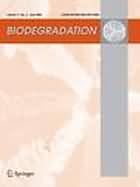|
Literature / Source Database:
Biodegradation
| Title (short) |
Biodegradation |
| Languages |
English |
| First year |
1990 |
| Impact factor |
2.208 |
| Editor |
Ronald R.L. Crawford |
|
|

|
Status
active
Indexing
Agricultural and Environmental Biotechnology Abstracts, Aqualine, ASFA 3, Aquatic Pollution and Environmental Quality, BioEngineering Abstracts, Biological Abstracts, BIOSIS, Biotechnology Citation Index, CAB Abstracts, CABS, Chemistry Database, Compendex, Compendex Plus, Current Contents/ Agriculture, Biology & Environmental Sciences, Ei Page One, Engineering Index Monthly, Environment Abstracts/Enviroline, Environmental Engineering Abstracts, Fluidex, GeoArchive, Geobase, Geotitles, ISI Alerting Services, Microbiology Abstracts Section A: Industrial and Applied Microbiology, Microbiology Abstracts Section B: Health & Safety Science Abstracts, Microbiology Abstracts Section C: Algology, Mycology and Protozoology, Oceanographic Literature Review, Pollution Abstracts, Science Citation Index, Science Citation Index Expanded, SCOPUS, Water Resources Abstrac
Subject

Source type
Journal
Publisher
ISBN ISSN
0923-9820
First volume
1
Last volume
19+
Publish city
Dordrecht
Homepage
| Resources |
|
Availability |
|
|
|
|
|
| Text PDF |
 |
free access |
 |
| Text Html |
 |
for subscriber |
 |
| References |
 |
not available |
 |
| Abstracts |
 |
|
|
| TOC |
 |
|
|
|
|
|
|

Description
Biodegradation publishes papers, reviews, and mini-reviews on all aspects of science pertaining to the biotransformation, mineralization, detoxification, recycling, amelioration or treatment of chemicals or waste materials by naturally-occurring microbial strains, microbial associations, or recombinant organisms. Submissions of manuscripts describing fundamental studies and novel discoveries are highly encouraged. Biodegradation does not publish routine case studies or results of biotreatment demonstrations that do not present new concepts or novel observations. Areas of particular interest include: - biochemistry of biodegradative pathways;
- genetics of biodegradative organisms and the development of recombinant biodegrading organisms;
- molecular biology-based studies of biodegradative microbial communities, including metagenomic approaches (examinations of whole-community genomes);
- enhancement of naturally-occurring biodegradative properties and activities;
- novel applications of biodegradation and biotransformation technology, e.g. to soil, water, sewage, heavy metals and radionuclides, organohalogens, high-COD wastes, straight-, branched-chain and aromatic hydrocarbons;
- modelling and scale-up of laboratory processes and design of bioreactor systems;
- economic and legal aspects of biological treatment of waste.
|